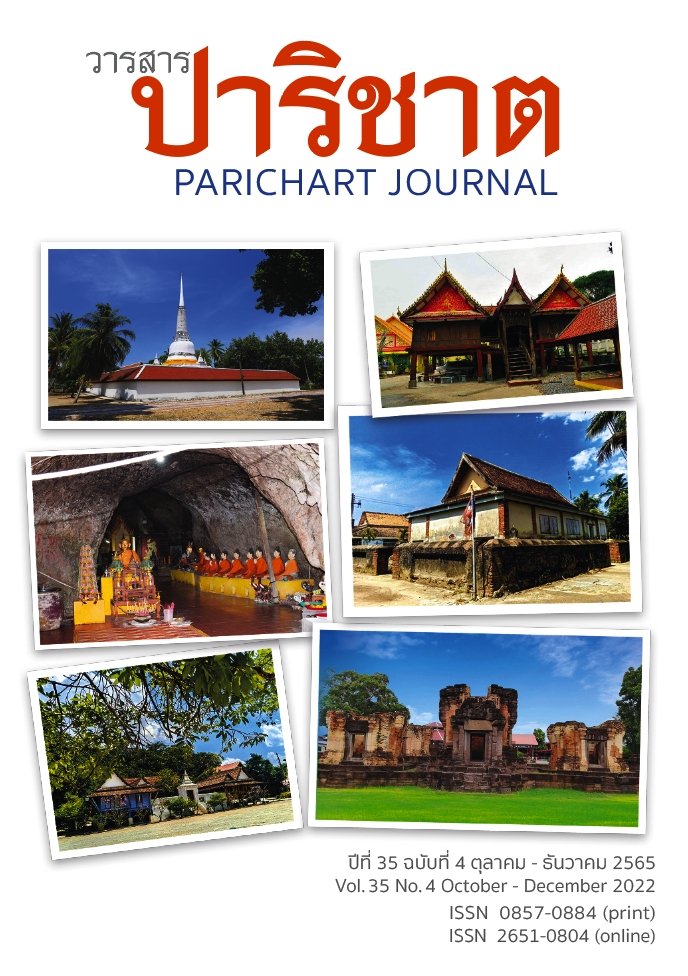อิทธิพลของการตลาดดิจิทัลต่อเส้นทางผู้บริโภคยุคใหม่ในจังหวัดภูเก็ต
Main Article Content
บทคัดย่อ
การวิจัยเรื่องนี้มีวัตถุประสงค์เพื่อศึกษา 1) เครื่องมือการตลาดดิจิทัลที่มีอิทธิพลต่อการไว้วางใจของผู้บริโภคยุคใหม่ 2) เครื่องมือการตลาดดิจิทัลที่มีอิทธิพลต่อเส้นทางผู้บริโภคยุคใหม่ 3) การไว้วางใจที่มีอิทธิพลต่อเส้นทางผู้บริโภคยุคใหม่ ศึกษาจากประชากรจังหวัดภูเก็ต ขนาดกลุ่มตัวอย่างจำนวน 430 ตัวอย่าง สุ่มแบบบังเอิญ ใช้แบบสอบถามเป็นเครื่องมือในการเก็บรวบรวมข้อมูล วิเคราะห์ข้อมูลโดยใช้สถิติ ค่าเฉลี่ย ส่วนเบี่ยงเบนมาตฐาน การวิเคราะห์ความถดถอยอย่างง่าย และสมการถดถอยพหุ ผลการวิจัยพบว่า 1) เครื่องมือการตลาดดิจิทัลที่มีอิทธิพลต่อการไว้วางใจของผู้บริโภคยุคใหม่ในจังหวัดภูเก็ต อย่างมีนัยสำคัญทางสถิติที่ระดับ .05 อธิบายความผันแปร ได้ร้อยละ 34.3 ตัวแปรอิสระที่สำคัญ ได้แก่ ผู้ทรงอิทธิพลบนสื่อออนไลน์ (Beta= 0.385) การตลาดเชิงเนื้อหา (Beta= 0.249) จดหมายอิเล็กทรอนิกส์ (Beta = 0.211) การครองหน้าแรก (Beta = 0.143) และ เว็บไซต์ (Beta=0.123) ตามลำดับ 2) เครื่องการตลาดดิจิทัลที่มีอิทธิพลต่อเส้นทางผู้บริโภคยุคใหม่ในจังหวัดภูเก็ต อย่างมีนัยสำคัญทางสถิติที่ระดับ .05 อธิบายความผันแปร ได้ร้อยละ 28.2 ตัวแปรอิสระที่สำคัญ ได้แก่ สื่อสังคม (Beta=237) การครองหน้าแรก (Beta = 0.230) และ เว็บไซต์ (Beta=0.194) ตามลำดับ 3) การไว้วางใจที่มีอิทธิพลต่อเส้นทางผู้บริโภคยุคใหม่ในจังหวัดภูเก็ต อย่างมีนัยสำคัญทางสถิติที่ระดับ .05 อธิบายความผันแปร ได้ร้อยละ 12.3 ค่าสัมประสิทธิ์ถดถอยค่าของตัวแปรอิสระ คือ การไว้วางใจ (Beta=0.350)
Article Details

อนุญาตภายใต้เงื่อนไข Creative Commons Attribution-NonCommercial-NoDerivatives 4.0 International License.
เอกสารอ้างอิง
Moneybuffalo. (2020). Who owns the e-commerce market in Thailand. https://www.moneybuffalo.in.th/business. (In Thai)
Reitzen, J. (2007 May 26). The importance of digital media and digital marketing. http://dspace.bu.ac.th/bitstream/123456789/2114/1/pattarawadee.rear.pdf.
Huang, Yi-shan (2009). What is Digital Marketing?. http://blog.13h.tw/2009/11/digital-marketing.html
Tarnprasert, P. (2016). The influence of digital marketing toward consumer’s buying decision via e-commerce in Bangkok. M.B.A., Graduate School, Bangkok University. (In Thai)
Schiffman, L. G., & Kanuk. L. L. (2004). Consumer behavior. (8th ed.). Pearson Education International.
Berry, L. L., & Parasuraman, A. (1991). Marketing services: Competing through quality. The Free Press.
Flom, J. (2011 June 7). The Value of Customer Journey Maps: A UX Designer’s Personal Journey. https://www.iimagineservicedesign.com/wp-content/uploads/2015/07/Experience-Maps-The-Value-of-Customer-Journey-Maps_-A-U...pdf.
CMGF Secretariat Thailand. (2020). Data analysis report: Household income and expenditure statistics 14 provinces and southern provinces 2020. Office of the Secretariat of the Council of Ministers and Provincial Governors, Prince of Songkla University. (In Thai)
Pipatseritham, K. (2017). Digital marketing. http://marketeer.co.th/archieves/603. (In Thai)
Baier. (1986). Trust and antitrust in ethics. http://www.praphansarn.co.th/Forum_new/comment/6/5105.
Phua, J., Jin, S.V., & Kim, J.J. (2017). Gratifications of using Facebook, Twitter, Instagram, or Snapchat to follow brands: The moderating effect of social comparison, trust, tie strength, and network homophily on brand identification. Brand engagement, brand commitment, and membership intention: Telematics and Informatics, 34(1), 412-424.
Thippayakraisorn, S. (2018). Digital age’s customer journey, a new marketing quest. Panyapiwat Journal, 10(2). 294-302. (In Thai)
Holliman, G., & Rowley, J. (2014). Business to business digital content marketing: Marketer’s perceptions of best practice. Journal of Research in Interactive Marketing, 8(4), 269-293.
Sawasdinam. K. (2017). Factors affecting trust of E-Marketplace in Thailand. Master of Business Administration, Graduate School, Silpakorn University. (In Thai)
Satham, N., & Sutamuang, K. (2014). Marketing mix factors, brand loyalty and brand trust affecting customers satisfaction of travel agency. Journal of Business Research and Administration (JBRA), 2(1), 1-25. (In Thai)
Odden, L. (2012). OPTIMIZE; How to attract and engage more customers by integrating SEO, social media, and content marketing. John Wiley & Sons.
Phasikhao, P. (2019). The effect of digital marketing media to product and service consumption way in Thailand. Master of business administration, Business Administration, Ramkhamhaeng University. (In Thai)
Suwanpakdee, P., & Jansri, W. (2018). The influence of trust, attitude and marketing mix on purchasing decision of fashion clothes via social media among consumers in Songkhla Province. Economics and Business Administration Journal Thaksin University, 10(2). 21-38. (In Thai)
Oppatum, P. (2014). Trust and characteristics of social commerce affecting the purchase intention via social media. Graduate School, Bangkok University. (In Thai)
National Statistical Office. (2019). The 2019 household survey on the use of information and communication technology. Ministry of Digital Economy and Society. (In Thai)
Yamane, T. (1973). Statistics: An introductory analysis. (3rd ed). Harper and Row Publication.
Black, K. (2006). Business statistics for contemporary


